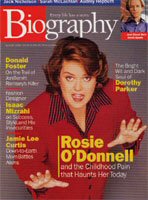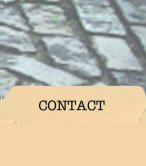
ARTICLES:

Sex, Lies, Videoptape, Missing Kids, and an Occasional Left Hook: The Life of P.I. Joseph Mullen
Biography
At first glance, he seems like just another Wall Street executive. Wearing an elegant gray suit set off by a pocket square, Joseph T. Mullen wades through a business report, one of many stacked on his desk. He ignores the phone, which rings incessantly. Letters of appreciation from clients such as Johnny Carson, Walter Cronkite, George Steinbrenner, and Franklin D. Roosevelt, Jr., cover an office wall.
But take another look. Those aren't profit-and-loss statements he's thumbing through -- they're surveillance updates. A loaded .38 is just a grab away. And don't let the fancy wardrobe and styled silver mane fool you: Mullen is one tough lug. "I remember when these two guys -- bodyguards for some New York financial big shot -- tried to rough him up," recalls Mullen's close friend, former U.S. Congressman Mario Biaggi. "A left and right, and down they went. He will play any role, quiet as can be or forceful when compelled."
It's that deft combination of brains and brawn, and knowing when to use them, that makes Mullen New York's most sought after private eye, a security pro who has run his own firm since 1970 and heads a squad of seven operatives, including four of his five children, Bonnie Jean Wolfe, Pam Vinci and Michael and Thomas Mullen (the fifth is Joseph Jr., an attorney). "It's exciting. There's always something different," says Tom, who has worked for his dad's firm, J.T. Mullen, for 19 years. Unlike most P.I.'S, who toil in relative obscurity in dingy offices, Joe Mullen has a casebook that reads like a year's worth of plot lines for a hit detective series. He has trailed Ivana for The Donald, guarded Walter Cronkite after the famous newsman received threats, worked on the ABSCAM investigation (the 70's Congressional bribe scandal), and uncovered a horse racing racket for FDR Jr. "I like helping people," Mullen says, with characteristic understatement.
Yet Mullen's life hasn't always been about mentions in the New York Post's "Page Six" gossip column or regular appearances at the Manhattan celebrity haunt, Elaine's. Born in the Bronx in 1935, Joseph Mullen is the youngest of three children of Frank, the head accountant at a major bank, and Beatrice, who died in 1948. Mullen's career inadvertently took shape when he was a 16-year-old Catholic high school student.
"My father got tired of the bank business, so he got involved with investigating someone they thought was stealing money from the bank," Mullen recalls. "One day, I forgot my apartment keys so I went to my father, who was on surveillance in a car on Park Avenue and 86th Street. All of a sudden, a subject came out and headed west. "Follow him," my father ordered. So I did. For eight hours. To a restaurant, a hotel, into a cab. When I got back, I reported what I found out -- addresses, license plate numbers. (He) thought I did great work."
Mullen was hooked. "I asked my father if I could work once or twice a week. It turned into three or four days a week," he explains. By the time he was 18, he was a full-time detective, with a keen eye for surveillance work -- and eligible young ladies. In 1955, he married his first wife, Barbara, a bank secretary. At that point, Mullen, just past 20 and with a wife to support, began cultivating friendships with attorneys who handled showbiz clients, alliances that served him well over the years as he developed his celebrity clientele.
One of his first -- and most memorable -- cases was "a problem" between the legendary singer Judy Garland and her then-husband, Sid Luft, says Mullen, "I picked her up at the hotel, where she's having a fight with Luft. We go to the airport and she says, "let's have a couple of drinks at the bar club," he recalls with a rueful laugh. "So her plane is leaving, and as we come out of the bar, the press spots her. So she grabs me and starts doing this [sashaying] walk down this sweeping staircase. Then she says [to me, in a stage whisper]: "Honey, don't tell them who my new boyfriend is."
By the time he was 30, Mullen had started his own business, a successful enterprise built on commonsense techniques like wedging a match in a door frame to learn if anyone has entered or left, or dropping coins in front of a house, which gives a hidden photographer more time to snap photos when a suspect stops to pick up the change. "I'm a big believer in stepping back to look at a situation objectively," says Mullen, who commands $200 an hour for his services. "Emotion can be a killer. My job is to turn the lights on so [my clients] can see what's been going on."
Over the years, Mullen has handled divorce cases for famous clients such as Johnny Carson, and unraveled corporate skullduggery for major Wall Street law firms. But his most satisfying cases have been locating missing children. "I've found at least 100 children," he says proudly. "I have 14 grandchildren. Who wouldn't [find children for their parents]? It makes me feel terrific." The worst part of his job? "Sometimes you realize you're on the wrong side of a matrimonial case. You're working for the mother and she's a drinker and has 11 boyfriends and the husband is a terrific father. So I call the attorney and say, "You gotta get me out of this."
Although Mullen has slowed down a little with age, he still puts in a respectable ten-hour day, often rising at 6 a.m. to keep up-to-date on his caseload. While he divorced in 1980 ("It was my fault," he admits. "I was traveling all the time. Meeting stars."), Mullen was remarried three years ago to Suzanne Kramer, a public relations executive. "We lived in the same apartment building. I would see him jogging in Central Park, so I wrote him a note saying we should run together," she confides. "He called me six months later."
The couple splits time between Manhattan and Key Biscayne, Florida, where Mullen occasionally takes on cases. He also loves fishing and eating out with his good friends, Biaggi, and former boxer, Jimmy Archer. "I boxed with him recently in an exhibition bout," the onetime welterweight/middleweight with a 32W/8L record says of Mullen, an amateur boxer. "I couldn't take him lightly. He was able to keep up with me."
A fighter to the finish, Mullen would never quit in the ring -- or on the job. "I've never thought about stopping," he says, waving off any suggestion of retirement. "Sure, I get a little tired of dealing with people's lives. It burns out your energy. But you know, it feels the same to me as running, I have to keep moving. I'm the John Wayne coming over the hill."
HE RAN, BUT HE COULDN'T HIDE.
To put a new spin on an old Paul Simon tune: There must be 50 ways to cheat your lover. If that's so, Joe Mullen has probably uncovered most of them. Among the hundreds of infidelity cases the detective has solved for spurned lovers, including many celebrities, Mullen takes particular delight in this tale of a vanishing husband, a bumbling actress, and flying garbage.
"About ten years ago, Burton 'Buddy' Monash, the king of divorce lawyers in the '80's, asks me to handle a case for one of his clients who is the wife of a major Hollywood producer, worth $50 million. She is suing him for divorce, but the guy has disappeared. I start asking around and find out he's been seen around L.A. With this gorgeous 5'11" cover girl. We call her modeling agency; they tell us she moved, there's no way to contact the woman, and that any inquiries must go through her attorney.
"Since we don't want to tip our hand, I use a Social Security tracker, which provides a current address, and trace the model to a Fort Worth, Florida, post office box. I go to Fort Worth and wait. I find her and follow her back to this gorgeous house with a 'For Sale' sign out front.
"I call an actress I know who lives in the area and ask her to come with me to the real estate agent. We tell the agent that we are brother and sister and would like to see the home, which is worth $1.2 million, for our father, 'Henry.'. On the way over, the actress gets our 'father's' name wrong, and the agent gets a little suspicious.
"When we arrive, I check out the bathroom. Bingo. The producer's name is on medicine labels in the cabinet. Since a photo is worth a thousand words, I use my small hidden camera to take pictures of the guy's medicine and his clothes in the closet. While I'm in the bedroom, putting their garbage in a plastic bag I had brought along, the producer and the model drive up. I'm trapped! So I take the bag of garbage and throw it out the window. But the guy sees it and I think it tips him off. When they come in, everybody shakes hands, but the guy's not too friendly. And, to boot, my 'sister' is still using the wrong name for our phony father. I ask if I can take a picture of the outside of the house and suggest everybody be in it. Later, when I develop the pictures, you can see it in his face: he knew he'd been had."
ANATOMY OF A CASE
We've all seen a firefighter put out a fire. Or an accountant compute our income taxes. Their methods are familiar to us. But how exactly do private eyes solve a case? Their procedures are typically shrouded in secrecy, and most detectives are loath to discuss the tricks of their trade. Here, Joe Mullen reveals the details of a specific case and the combination of cunning and common sense he used to reunite distraught parents with their missing teenager.
"A New York City father visits me some years ago and tells me his 16-year-old daughter has run away from home, leaving a note saying she's going to Hollywood. The first thing I do is ask the parents some questions. Among them: What kind of clothing did she take? Some jackets and bathing suits, they answer. Where do they go during vacation? We went to Fort Lauderdale and she really liked it, they say.
"Then I ask the parents for two names: (that of) the girl who used to be her best friend, and the girl who currently is her best friend. I speak to both. The former best friend tells me the runaway has met a 40-year-old man in Fort Lauderdale. She says she had urged her not to get involved; that's why she was the former best friend. As it turns out, the current best friend allowed the runaway to use her parents' phone to talk to the Fort Lauderdale man.
"I visit the parents of the current best friend. They say they were getting big phone bills, with several Florida phone numbers itemized. The father of the runaway pays the bills and, in turn, the parents of the best friend give him access to the bill. I take that bill back to my office and use a reverse directory -- a phone directory that allows you to look up a phone number and find the name and address of the business or person it belongs to. The numbers that are all located in Fort Lauderdale are clubs or pay phones.
"Then I send a photo of the daughter and $50 each to six taxi dispatchers in the area and tell them if they locate her for us we'll give them $500. That's a lot cheaper then sending two operatives to the area to look for her. The next thing you know, one of the guys says he dropped the girl off at an address he provides. I fly to Fort Lauderdale and visit that address. I find out the runaway is living there with the 40-year-old man, who is a bartender. The parents join me and we watch, but don't approach, as the runaway leaves the apartment to go to the beach.
"I ask some local cops (who could flash their shields) to come with me when I visit the boyfriend. 'You have a choice,' I tell him, 'Either tell her to leave or get arrested because she's underage.' Then we leave. The runaway returns. Soon after, she leaves again, and this time, she looks upset. The parents show up, pretending we've just arrived. The runaway tells the parents her boyfriend dumped her. I bring the whole family back home."











